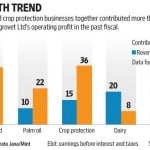Please use the sharing tools found via the email icon at the top of articles. Copying articles to share with others is a breach of FT.com T&Cs and Copyright Policy. Email [email protected] to buy additional rights. Subscribers may share up to 10 or 20 articles per month using the gift article service. More information can be found here.
Business conditions in Japan are at their strongest for a decade as the closely watched Tankan index hit its highest level since 2007. The reading for large manufacturers rose by five points to +22 in September, fuelled by strength in chemicals and machinery, as the effects of a weaker yen feed through to exporters. Economists surveyed by Reuters had forecast +18. Evidence of strong industrial activity will boost Prime Minister Shinzo Abe as he fights a tricky general election against Yuriko Koike, Tokyo governor. It points to a healthy pace of growth in the third quarter of the year. The overall Tankan index, covering all industries and companies of all sizes, rose by three points to a reading of +15. That was the highest reading since September 1991, showing the breadth of Japan’s recovery. It highlights the progress made since Mr Abe came to power in 2012 on a platform of economic stimulus. The Bank of Japan has since slashed interest rates and purchased trillions of yen in government bonds as it tries to escape from two decades of on-and-off deflation. Japan’s unemployment rate is down to 2.8 per cent. Exporters have gained from a weaker yen, currently around ¥112.7 to the dollar, with a renewed drop after Donald Trump was elected as US president last November. However, inflation remains stubbornly close to zero. The quarterly Tankan index subtracts the percentage of companies reporting bad business conditions from those reporting good to give indices ranging from -100 to +100, where figures above zero suggest a growing economy. Japan’s unreliable statistics on consumption and output, which are prone to large revisions, mean the Bank of Japan relies heavily on the Tankan to track the business cycle. The survey samples more than 10,000 companies with a response rate of nearly 100 per cent. By industry, the reading for production machinery rose by 13 points to +36, while electrical machinery was up 11 points to +27. Construction remained strong at +48, with hectic building ahead of the 2020 Olympics, while business services rose by seven points to +40. Companies of all sizes reported deepening labour shortages, with the Tankan index for employment conditions weakening by three points to -28. The reading on production capacity also dipped by one point to -3, the lowest since 1991, as Japanese companies report they are unable to keep up with demand for the first time since the bursting of the country’s stock market bubble in 1990.
Source:_ft




